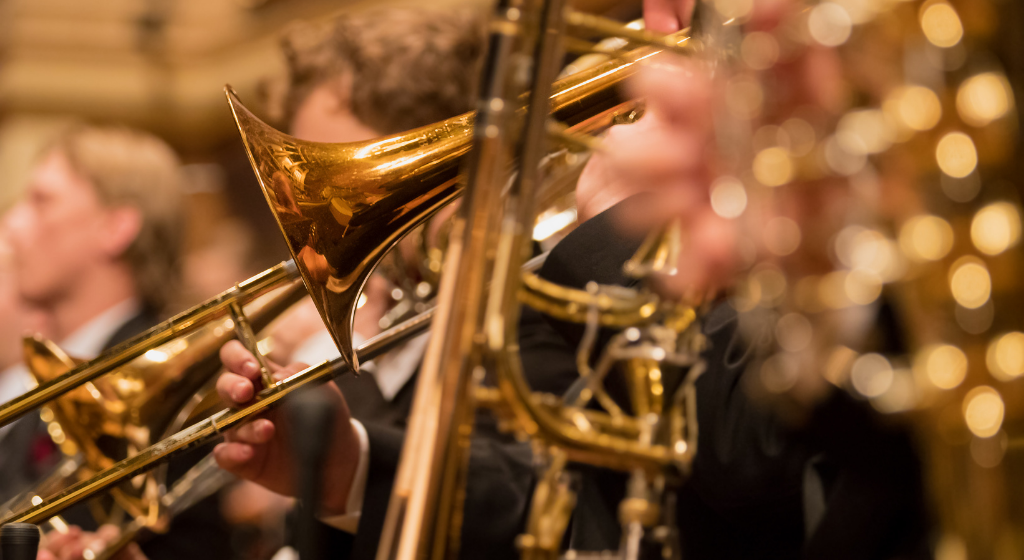You probably know it too, when the day was too stressful and the first thing you do after coming home is put your favorite playlist on to relax. Or when even if not everyone likes to admit it, it always gives you goosebumps when you hear Whitney singing „I will always love you“. Or when, at the end of the year, „Last Christmas“ by Wham plays on the radio for the first time – some people can’t stand it and others get this warm feel-good feeling. There are certainly numerous other examples, but it quickly becomes clear that music is a powerful tool when it comes to evoking emotions in us. This realization is not new. Places, where this effect is definitely heavily implemented, are the major Hollywood studios. They have perfected this art of touching people in their innermost being by combining images and music. Music also has great significance outside the entertainment industry, for example, when it comes to helping people. Music therapy is extremely successful in reducing negative emotions, lowering anxiety, physical and emotional pain, influencing muscle tension, high blood pressure, and stress hormones.
The LUMEUS app helps with the use of the Herzog method
In our LUMEUS app, we use this influence that music has on our feelings, together with spoken visualizations, to evoke emotions that can change our behavior in the long term. Our training program is based on the Herzog Method and the music you hear is film music written especially for the trainings by the composer David Christiansen and was recorded together with the Budapest and Berlin Symphony Orchestras.
https://youtu.be/n43bbOaG0Fc
“ I thought it’s a very powerful project, I heard the voice recordings before, I felt that it’s so powerful that I wanted to create music for it. I had a feeling that whenever I told musicians about this project they all understood and identified with it very well as they all have a family member, child, or friend that might have experienced some emotional difficulties.
“
But what exactly is behind the power of music that can give us beautiful moments and alleviate bad ones in equal measure?
We talked to David Christiansen about this and summarized the key findings of the current research for you.
The theory behind the art: what science knows about the effect of music
Almost all theories about musical compositions and ways of their interpretation, emphasize the importance of music as an irreplaceable medium in the process of communicating feelings and emotions. Bob Marley, in the song „Trenchtown Rock,“ sang: The good thing about music is that when it hits you, you feel no pain. There are studies that directly speak about the beneficial effect of music on the human body, as well as on its development! And this is true at every stage of a person’s life. Music has both a mental and physical impact on your body and it can help boost your overall well-being. From reducing stress and improving cognitive performance, to encouraging and inspiring creativity, the power of music is truly amazing. In fact, researchers at Stanford University have even claimed that music seems to be able to affect brain function “to the same extent as medication in many circumstances.”
“I think music evokes emotions in us so well it’s because hearing is the first sense we develop. Even before we are born, it’s the first thing we experience, we don’t see or understand the world but we can hear it surrounding us. “
– David Christiansen
Music appears in our lives earlier than language.
Music appears in our lives earlier than speech. Children already react to environmental sounds in the prenatal period. From the earliest moments of life, babies respond not only to their mother’s singing but also to other sounds from the world around them.
In 2013, researchers at Beth Israel Medical Center in Boston studied a group of 272 premature babies born at 11 different hospitals. The researchers subjected them to a special kind of music therapy. They chose sounds resembling the sounds in the womb such as heartbeat and ocean noise. These ranged from music based on percussion instruments to lullabies sung by medical staff and the toddlers‘ parents.
The music therapists also chose music to match the baby’s heart rate and breathing rhythm. The results of the study were surprising – the babies were calmer, slept better, and were less stressed, which also had a positive effect on their parents.
By recognizing our emotions we find ourselves
Music, more than other arts, reaches into the depths of the human psyche. It influences its recipient even before he or she has the ability to understand it and perceive the musical work as an object of artistic value. Sound transmits a load of feelings and moods, which put the listener in specific states, perceived by them as joyful, sublime, or sentimental. When we lack words to describe our emotions, feelings, experiences, music comes to our aid, as it is able to „describe“ what is „indescribable“, to express our longing, joy, pain, excitement.
I think the moment of composing is very special to me, it’s like a dialog with myself. I love to write music for orchestra and record with real-life musicians. I create something and people give the energy and life into it.
– David Christiansen


It is often said that music is the language of emotions, that music expresses emotions. It is also noted that emotion is one of the basic contents of music because it expresses what touches and moves a person.
The emotions induced by music are sometimes referred to as refined emotions because self-reflection and self-awareness play a determinant role in them. Despite the fact that they are not connected to the basic life goals of a human being, they are equally important. Musical emotions, but also the music itself, help in forming one’s own identity, creating one’s own self, defining one’s place in the peer group.
Music not only has an effect that shapes the imagination but also influences emotional development and – which is related to this – plays a large role in the process of socialization and development of interpersonal bonds.
For example, Some people can’t stand crowds and even in a store they can get a little nervous and tired, but when it comes to a concert by their favorite band it doesn’t matter. They just go and hope to have a good time with all the other fans.
Music and our memory: a journey into our own past
One of the main reasons people listen to music is to provide themselves with an emotional experience. According to researchers, what moves us in music is what we perceive as sincere but also somehow close to us. Certainly, reactions to music can be very powerful because they are genuine, natural, unforced, and stripped of masking. Music becomes a field that makes it possible to be ourselves, to reveal ourselves completely, without being exposed to ridicule or the sensitivity depreciated today.
I traveled a lot for a while and during that time I didn’t listen to music for a while(just on the radio). I realized, I felt low and bad and I didn’t know why. Then I bought a CD player and instantly felt better, happier, it was a feeling like I was coming home after a long time of absence.
– David Christiansen
Sometimes a certain piece of music is associated with a specific situation that a person has experienced in his or her life. Music very often evokes memories, especially when certain music has been repeatedly played in the past in conjunction with another stimulus that was emotionally charged. As a result of this process, through the formation of a conditioned reflex, listening to specific music automatically elicits positive or negative feelings associated with the affective stimulus, even without the occurrence of that stimulus. Specific music can evoke positive emotions, e.g. when it has been listened to repeatedly in the past during pleasant social gatherings, and negative emotions when it has accompanied stressful work situations.
Music acts here as a so-called context cue: by recalling a specific event from our memory, it evokes a specific mood in us, just as the sound of the sea evokes pleasant vacation memories. Often, when we reach adulthood, we are nostalgic for music that we define as „our“ music, so it is usually music that we listened to during adolescence. Adolescence is the stage of experiencing particularly intense emotions, and thus the music reception marked by emotions becomes particularly long-lasting. The occurrence of a peculiar nostalgia for the past and its idealization is certainly of considerable significance here.
Music, a language of the whole world
Research around the world, both in medicine and psychology and in the last few decades in music therapy, demonstrates that appropriately selected music elicits specific emotional responses. These studies usually describe changes in a person’s mood during musical activity, when playing or listening to songs. The most common are relaxation, calming or excitement, motivation, or changes in mood.
Emotional responses to music reception occur equally in both musically educated and musically uneducated individuals. The discovery that emotions can be recognized even in music from very distant cultural backgrounds says a great deal about the universality of emotional experience. Often emotions are aroused by a piece of music that one has never heard before, so there is no question of recalling a memory.
A recent cross-cultural study showed that members of the African Mafa tribe, who had no previous contact with European culture, recognized joy, sadness, and fear in European music. This means that the recognition or arousal of emotions by music cannot be explained by the knowledge of cultural convention – that is, the fact that certain sounds or musical fragments usually appear in a given context. In every culture, people experience strong emotions when they engage with music, which demonstrates the cross-cultural universality of music. These experiences are powerful, meaningful, and motivating for further action.
Das Bewusstsein für die durch musikalische Erfahrungen ausgelösten Gefühle ermöglicht es den Menschen, ihre eigenen Emotionen und Stimmungen zu projizieren und angenehme (positive) oder unangenehme (negative) Emotionen zu wecken. Emotionen, die durch das Hören von Musik ausgelöst werden, sind von kurzer Dauer. Werden die Emotionen aber mit einer bestimmten Situation (vorgestellt oder real erlebt) verknüpft, können sie sehr, intensiv sein und lange im Gedächtnis und im Unterbewusstsein bleiben


Music gets into the nerves, into the blood, and goes to the head
The main physiological manifestation of music’s effect on mood is the activation of the autonomic nervous system. Music evokes emotions that are activated by its rhythm and tempo. This affects the level of arousal a person experiences. Therefore, it is not said that only energetic music will put us into ecstasy. Any music is able to improve our mood as long as the brain perceives it as beautiful, harmonious, and soothing. Music affects the production of epinephrine, norepinephrine, serotonin, dopamine (Panksepp and Bernatzky, 2002), which have a significant impact on our mood. Researchers claim that there are special structures in the brain responsible for the perception of music and its meaning. In turn, the emotional response to it is the result of the interaction of many areas. The centers of interest, emotion, reward, and motivation are involved. We are different as people, hence the different reactions of each of us to music, the different tastes of listeners.
Contact with appropriately selected music can therefore contribute to the reduction of physical and emotional tension. It should be added that the relaxing nature of songs is usually associated with such features of the musical structure as a slow tempo, simple, repetitive melodic patterns, harmony, and rhythmicity. However, the results of some studies indicate that music in accordance with the listener’s preferences may be useful for lowering stress levels even if it does not have a typically calming character. The effect of music on the physiological and emotional processes of the listener is determined not only by the structure of the piece of music but also by the individual characteristics and the current mental and somatic state of the listener. Such variables as, for example, personality, musical preferences, current mood, and physical well-being, personal memories and connotations of the listener associated with a particular piece of music, and many others are relevant here. Therefore, reactions to music are not always easy to predict – the same piece of music may make some listeners feel better, while others feel worse.
In summary, the importance of music to life has probably always been evident and will always be part of our lives in a very complex way.
Our conclusion: music: catches your ear, stays in your head and helps body and mind.: Musik: Geht ins Ohr, bleibt im Kopf und hilft Körper und Geist.
Ähnliche Artikel


Antje: 40 kg weniger und keine Depressionen mehr!
30 April 2024


Die innere Kraft: Eine neue Perspektive der psychischen Gesundheit für ein effektives Gewichtsmanagement
16 Januar 2024


Der Schlüssel zum Wohlfühl-Gewicht: Abnehmen durch Emotionen
28 November 2023
Pressemitteilung Der Schlüssel zum Wohlfühl-Gewicht: Abnehmen durch Emotionen München - 28. November 2023 Guten Tag read more

